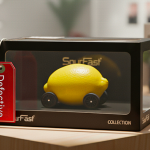Why Malaysia Is Hooked On Blind Boxes: The Rise Of Mystery Collectibles

Walk into any POP MART store in Kuala Lumpur and you will surely find a crowd excited to get their hands on the latest Labubu or Crybaby figure. What started as a niche hobby has turned into a full-blown cultural trend, blending pop culture, retail therapy, and the thrill of surprise.
Each box can even cost up to around RM70 to RM100, but the emotional payoff can feel priceless for some. That fleeting rush of anticipation, the satisfaction of a rare pull, or the joy of completing a collection. For some, it’s a game of luck. For others, it’s a way to express taste, identity, or nostalgia in miniature form.
The question to ask now is: How did these little mystery boxes take over the hearts and minds of Malaysians?
Why Do Malaysians Love Blind Boxes?
The element of surprise lies at the core of every blind box; and the appeal of surprises can be addictive. That split second before the reveal — the wondering, the hoping, the not knowing — triggers the same dopamine rush that keeps us hooked on games, raffles or lucky draws.
The fascination with chance runs deep — even outside the world of collectibles. Recently, a Selangor couple made headlines after a romantic blind box surprise turned into a RM13.26 million Magnum 4D jackpot win, a reminder of just how intertwined luck and anticipation have become in Malaysian culture.
It is not just about owning a specific toy or product; it’s about the emotional rollercoaster that comes with it. In psychology, this is known as the anticipation-reward loop. It is a cycle where the uncertainty itself becomes the fun part. Many collectors get a rush of excitement just from the anticipation and unboxing of their collectibles — which in itself can act as a form of stress relief.
Social media has only helped to fuel this excitement. On TikTok and Shopee Live, Malaysians eagerly share their unboxing moments, turning what used to be a private thrill into a communal experience. All the engagement they get online only heightens the buzz. Before long, another box is added to the cart.
The Blind Box Trend Hits Malaysian Mainstream
While POP MART did not invent the blind box, it has certainly played a huge part in making it the sensation it is today. Its popularity has begun spilling over into other major local retailers such as ZUS Coffee, Miniso, and Watsons.
ZUS Coffee’s limited-edition merch drops, Miniso’s surprise collaborations, and Watsons’ seasonal mystery gifts all tap into the same idea: the thrill of the unknown. It’s a clever way to keep people engaged, coming back for more, and sharing their loot online.
Beyond the marketing gimmick, this approach reflects a shift in how Malaysians shop. With online shopping becoming ever more popular, retail isn’t just about products anymore — it’s about experiences they can offer. The simple act of unboxing has become a new form of entertainment, blending shopping, storytelling, and community into one package.
The Collector Economy And The Business Of Surprise
What began as an exciting new hobby has turned into a mini-economy of its own. Across all forms of social media, collectors are trading, selling, and celebrating their latest blind box hauls. Some avid collectors chase the thrill of completing a full set, while others hunt for elusive rare collectibles that can sometimes resell for up to RM1,000 to RM3,000 on local collector groups.
Brands have certainly taken notice of this trend. In 2025 alone, the Malaysian toys and hobby market is projected to reach around RM7.69 billion (Approx. US$1.8 billion), growing at around 5.1% annually. Ultimately, the business of blind boxes isn’t just about toys. It’s about emotion — anticipation, belonging, and that irresistible rush of the unknown; with a little dash of FOMO (Fear of missing out) sprinkled in.
The Emotional Side Of Collecting
As mentioned previously, emotion plays a huge part in what drives collectors into a frenzy with regards to blind boxes. This phenomenon is similar to what psychologists describe as emotional spending. In other words, sometimes people buy not out of need, but for the positive feelings that come with it. That moment of anticipation before the reveal, the satisfaction of completing a set, or the nostalgia of reconnecting with childhood toys — all of it taps into a deep human desire for reward and reassurance.
This sense of comfort has become even more valued in a post-pandemic world. Collecting gives people something tangible to look forward to — a little ritual of happiness. Some collectors on TikTok have even described the feeling of finally completing a collectible set as being greater than that of winning the lottery. In the end, blind boxes remind us that even small surprises can make ordinary days feel special.
When Fun Becomes Financial Strain
It is not all fun and games when it comes to collectibles. Like any passion, collecting blind boxes can easily tip from fun to excessive. The dopamine hit we crave from these collectibles can easily become an addiction. The “just one more box” mentality has led some collectors to spend hundreds, even thousands, in pursuit of a rare piece.
Collectors online often talk about the guilt of duplicates or the frustration of near-misses, yet many still go back for another try. Psychologists call this the variable reward loop. This is the very same psychological trap that many mobile and gacha games utilised to keep people hooked on unpredictability.
A recent viral case involved a 23-year-old Malaysian who reportedly fell into RM93,000 in debt after borrowing money to fund his blind box reselling business. While extreme, it highlights how the line between hobby and compulsion can blur when emotion drives spending.
Fortunately, these are some of the more extreme examples of the hobby. Most fans still manage to find a balance. Many set monthly budgets, trade duplicates instead of chasing every variant, or simply unbox for the joy of it. Like any hobby, you should enjoy it in moderation and make smart financial choices.
What’s Next For The Blind Box Boom
While the initial frenzy for blind boxes has slowed down a little since its peak in 2022-2023, the blind box craze in Malaysia hasn’t disappeared — it’s simply matured. The hype may have cooled, but the culture remains strong, especially among loyal collectors and casual fans who are still in it for the thrill of the surprise.
POP MART in Malaysia has continued to expand its presence with themed stores and additional collaborations. ZUS Coffee and Miniso are still going strong with limited edition mystery merchandise promotions every so often. The format has shifted from “viral novelty” to a steady, experience-driven form of engagement — one that taps into nostalgia, design, and emotional connection.
Looking ahead, the blind box model is likely to evolve rather than fade. Expect to see smarter integrations. In the near future, we will likely see expansions into digital collectibles, artist collabs, and more.





